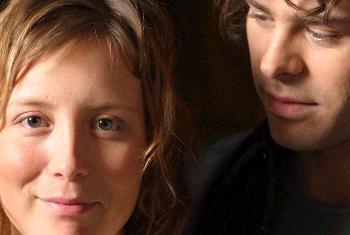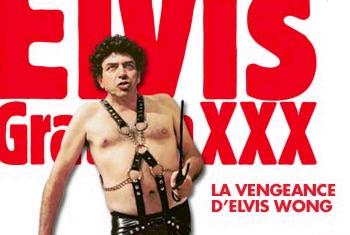LES RENDEZ-VOUS DU CINÉMA QUÉBÉCOIS
February 17>27 in Montreal
February 21>27 in Quebec city
This annual festival presents the local films produced in the year that just ended, plus a few premieres. The full schedule will be online February 9th eventually.
OPENING FILM
Manners of Dying (Jeremy Peter Allen) 53
“Regulations”, “schedule”, “as outlined in the procedural checklist”… When death-row convicts come to Harry Parlington (Serge Houde), director of the Cantos prison, they can be assured that everything will go without a hitch. It’s a well-oiled execution machine, the only thing that can be unpredictable is the condemned’s behaviour.
“Manners of Dying” was made on a limited budget, but the visual grittiness is appropriate, the no-frills direction mirroring the cold and clinical way Parlington and his crew go about their business. The only “gimmick” here is how the film goes through prisoner Kevin Barlow (Roy Dupuis)’s last meal, last night and execution through lethal injection once, then it starts over with things happening in various different manners, “Run Lola Run”-style. Barlow is alternately afraid, sad, resigned, kicking and screaming, philosophical, irreverent…
The film doesn’t really add anything to what we’ve seen in “Dead Man Walking”, “The Green Mile” and “Dancer in the Dark”, beside the fact that all the possible ways of facing death are experienced through a single man. The concept is stretched a bit too thin (they should have stopped at 4-5 “manners” instead of going up to 7), but it remains intriguing and it makes for a great acting showcase for Roy Dupuis.
CLOSING FILM
Les Guerriers (Micheline Lanctôt) 70
This adaptation of Michel Garneau’s 1989 play was made for TV (it will air on Radio-Canada later in the year), but it’s smarter and ballsier than most of the movies that hit multiplexes. Not unlike the stage-to-screen translations of David Mamet’s “Glengarry Glen Ross” and Eric Bogosian’s “Talk Radio”, Micheline Lanctôt’s film manages to make a very talkative piece feel dynamic enough.
“Les Guerriers” tellingly opens with stock images of rams locking horns. We then meet Paul (Patrick Huard) and Gilles (Dan Bigras), who are conducting their own alpha male ritual. Their publicity agency has just landed a huge contract, finding a new slogan to promote the Canadian Armed Forces. But how can you top something as wonderfully delusional as the old “Si la vie vous intéresse” campaign? For ten days straight, the two men will relentlessly brainstorm, fuelled on expensive scotch and cigars, struggling to think of a way to convince kids that training to become a mindless killing machine is reasonable.
This is a simple but effective premise, allowing Garneau to discuss all of the great questions of our era through his characters. The philosophy of war, of course, but also how violence relates to sex and religion, the way publicists empty words to make people want things they don’t need, etc. The dialogue can be heavy and very “written”, but it’s made more organic by the inspired performances of Patrick Huard and Dan Bigras. Huard has proven many times now that he’s got real acting chops, so the surprise here is that Bigras is able to relatively hold his own opposite him. Good stuff.
QUÉBEC ROUND-UP 2004
After the extraordinary year for local cinema that was 2003, with Les Invasions Barbares celebrated from Cannes to the Oscars, 2004 was a return to the usual. Crappy mainstream movies, pretentious art films, some great non-fiction work and a few entertaining AND smart genre flicks.

THE BEST OF THE BEST
Les Aimants (Yves Pelletier) [ review ] 91

GREAT DOCUMENTARIES
Daytona (amérika orkestra) [ review ] 77
mon fils sera arménien (Hagop Goudsouzian) 73
[ This powerful NFB documentary depicts filmmaker Hagop Goudsouzian’s journey back to Armenia, on the traces of the 1,5 million of his ancestors who were massacred or forced into exile by the Turkish between 1915 and 1923. This isn’t as well known as it should because many countries still won’t recognize this genocide. Goudsouzian takes with him a group of Montrealers of Armenian descent (including TV personality Patrick Masbourian) to the land of their forebears in search of the survivors of the genocide, whose number diminishes each year. They are all over 90 years old today, but they still feel the pain of fleeing Turkish assassins as kids and so do we listening to them. ]
L’amour en pen / De mémoire de chats (Manon Barbeau) 70
[ Manon Barbeau’s latest documentaries both display acute sensitivity, discovering truth and beauty in unlikely places. “L’amour en pen”, which has prisoners talking about the great love of their life, is surprisingly moving, maybe because it’s so rare to see men (convicts or not) open up and be vulnerable. “De mémoire de chats” explores Montreal’s countless back streets, taking in quiet beauty and sad decay, clothespins and heroin needles, gardens and dumpsters… Barbeau finds lyricism in the urban jungle, getting off the main roads and into the heart of the city. ]
le petit Jésus (André-Line Beauparlant) 70
[ In her follow-up to “Trois Princesses pour Roland”, art director turned documentary filmmaker André-Line Beauparlant once again turns her camera towards her relatives to try and make sense of some of their most difficult memories. In this case, she interviews her parents, siblings and friends of the family about how her handicapped little brother Sébastien (now deceased) affected their lives. This “story of a miracle that never happened” is filled with sadness, naturally, but there’s also anger at why this happened to them even though they were practicing Catholics who fervently prayed and went to church. Heartbreaking stuff. ]
Make Money. Salut, Bonsoir! (Martin Frigon, Christian Fournier) 61
[ This touching documentary depicts the harsh reality of corporations who set up in small towns, rack up millions while working the people nearly to death, then pack up and leave without saying thanks. Co-directors Martin Frigon and Christian M. Fournier give a voice to the angry, bitter former workers of the Noranda mine as they watch their native Murdochville crumble apart while most of them suffer of pulmonary diseases. ]

SOLID GENRE FLICKS
La Peau Blanche (Daniel Roby) [ review ] 69
Monica la Mitraille (Pierre Houle) [ review ] 69
mémoires affectives (Francis Leclerc) 63
[ Part of our Festival du Nouveau Cinéma coverage) ]
La Planque (Alexandre Chartrand & Thierry Gendron) 60
[ After stealing millions of dollars of heroin from their boss, two thugs nervously wait in a disaffected factory for their contact to show up. This ballsy huis clos shows that you don’t need a big budget, elaborate technique or a shooting permit (!) to make an effective movie. Using a couple of DV cameras, natural lighting and only general scene outlines, co-directors Thierry Gendron and Alexandre Chartrand follow actors Martin Desgagné and Pierre-Antoine Lasnier in long uninterrupted takes, allowing much tension to build up. The film is understandably a little rough around the edges, but it really works. ]
Le Dernier Tunnel (Érik Canuel) 49
[ Here’s further proof that we can make brainless and violent flicks as well as Hollywood, and on the cheap, too. This by-the-numbers heist flick is populated by walking clichés: the career criminal who won’t quit, the decrepit old pro, the hard-ass moneylender, the eager new kid, the wild card, the long-suffering girlfriend, the ball-busting parole officer… This is a B-movie all the way, but the cast (led by Michel Côté and Jean Lapointe) is solid and director Érik Canuel’s got a way with pop-up visuals. If you’re gonna watch trash, might as well make it local. ]

NOT TOO SHABBY
Premier Juillet, le film (Philippe Gagnon) [ review ] 47
Le bonheur c’est une chanson triste (François Delisle) [ review ] 36
Vendus (Éric Tessier) 34
[ Less than 4 months after the release of his scarily effective “Sur le seuil”, Éric Tessier follows it up with an underwhelming crime comedy. Double-crosses, violence played for laughs and wacky twists abound in this sub-Coen movie about a prostitute trying to blackmail the loser husband of a rich real estate agent. Tessier’s direction is dynamic and Véronique Bannon is like sex on a stick, but DV blown up to 35mm still looks horrible and “Vendus” is a mild diversion at best. ]
Ma vie en Cinémascope (Denise Filiatrault) [ review ] 31
Elles étaient cinq (Ghyslaine Côté) [ review ] 27
C’est pas moi… C’est l’autre ! (Alain Zaloum) 25
[ Vincent Papineau, a “petty thief trying to make an honest living” (!), finds himself in hot water after stealing than losing 230 grands from the Marseille mob. Then through a contrived case of mistaken identities, he finds himself posing as a Montreal policeman and he decides to use his new status to scam up some cash. Roy Dupuis, in a rare comedic performance, is amusing as the crook/cop, but the rest of the cast doesn’t fare as well. As Dupuis’ partner, Lucie Laurier is at a loss trying to make sense of her character’s constant mood changes, Luck Mervil is bamboozled into a homeboy role and the French actors playing the bad guys couldn’t be more annoying and less funny if they tried. ]

MAKE IT STOP
Camping Sauvage (Sylvain Roy & Guy A. Lepage) [ review ] 18
Jack Paradise, les nuits de Montréal (Gilles Noël) 17
[ Roy Dupuis has got charisma to spare, but he can still not manage to involve us in the by-the-numbers story of Jack Paradise, a French Canadian pianist who enters the often Black and English Montreal underworld from the 1930s to the ‘60s. This is a particularly poorly written film, with idiotic dialogue, one-note characters and a plot that’s little more than a loose string of clichés. The jazz music is cool enough, but the filmmakers lack the budget or the resourcefulness to truly recreate the period setting – the nightclub scenes always feel half-empty and lifeless, much like the movie. ]
La Lune viendra d’elle-même (Marie-Jan Seille) 15
[ Aimée (Isabelle Leblanc) is losing her struggle with AIDS and her boyfriend (the Artist formerly know as Jean Leloup) has abandoned her, but she still has her friend Francine (France Castel) accompanying her until the end. Here’s another film with a heavy subject it isn’t able to transcend. Writer-director Marie-Jan Seille spells things out too squarely and her attempts at symbolism fall flat. Castel breathes compassion, but Leblanc is insufferable in her long, slow, boring agony and the movie offers no greater insights than “Dying’s a bitch, eh.” Thanks for the heads-up, now can I have my 2 hours back? ]
Dans l’œil du chat (Ruby Barichello) 13
[ After an exceptional year where Quebec filmmakers showed they could make pictures both smart and entertaining, here’s a throwback to the days of desperately pretentious films that appeal to nobody. Simon (Jean-Nicolas Verreault) lost his girlfriend Pauline (Julie Le Breton) to a trip around the world from which she never came back. Months later he is still obsessed with her, even though he’s now dating her friend Gégé (Isabel Richer), with whom he only connects through lame movie sex. The movie is about clearing up the mystery of Pauline’s disappearance somewhere abroad, but in pure student film fashion it all takes place in a single apartment through endless phone calls, e-mails and faxes. Verreault is brooding throughout, generally half-naked and drunk, as if he were (badly) channelling Martin Sheen in the opening of “Apocalypse Now”. Colorful characters (notably Pierre Lebeau as the landlord) pop in occasionally, otherwise it’s moping and more moping. Ominous shots of Pauline’s orphaned cat walking around the apartment make one hope that some “Cat People”-style nonsense will shake things up, but no luck. “Dans l’oeil du chat” is reasonably well crafted, but it strives for heavy meaningfulness with no concern of drawing the audience in. ]
Comment devenir un trou de cul et enfin plaire aux femmes (Roger Boire) 11
[ Louis, a needy loser with the worst taste in clothes, has just been dumped again. His ex wants them to remain friends, but he’s had enough of being the “nice guy” and decides to become an asshole instead, since this is what women want. The whole movie revolves around such misogynistic ideas. They’re not necessarily wrong, but they’re definitely unhealthy. Embarrassing sex scenes and godawful musical numbers fill out this unpleasant picture, which is even more amateurish than a Simon Boisvert film. ]
Nouvelle-France (Jean Beaudin) [ review ] 8

THE WORST OF THE WORST
Elvis Gratton XXX: La Vengeance d’Elvis Wong (Pierre Falardeau) 6
[ Pierre Falardeau has never been known for his subtlety, but here he reaches a new low in moronic farce. Two decades after his creation, Elvis Gratton is more pathetic and less funny than ever. The boorish “p’tit gars de Brossard” is now the head of a giant media conglomerate, concerned only with profits and promoting Canadian unity. This allows Falardeau to hurl bile at politicians, journalists and intellectuals but, even if you agree with his opinions, they’re too crudely thrown into this cinematic cesspool to register as more than the whining of a frustrated old man.
Then again, the guy does have a sense of humor about himself. One cold December afternoon, I was at Fox Troc, a used CDs and DVDs store, when none other than Falardeau pops in, sees a used copy of “Gratton XXX” and loudly tells the owner, “Y a-tu un gars y trouvait ça pourri y est venu te l’porter?” That was funnier than the film. ]
A few more titles were released in Montreal through the year but somehow escaped my attention: Eternal, Littoral, Comment conquérir l’Amérique en une nuit…

